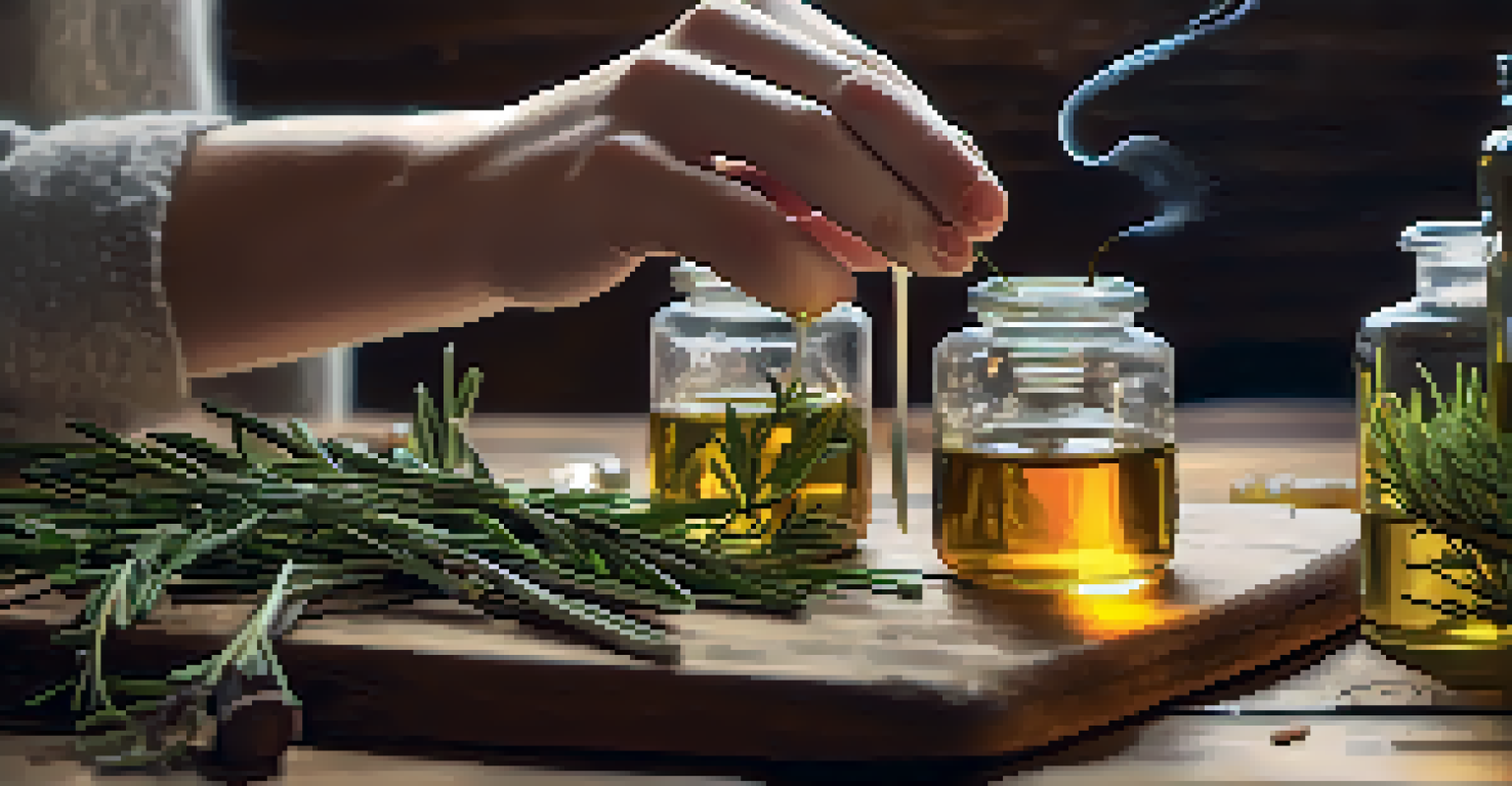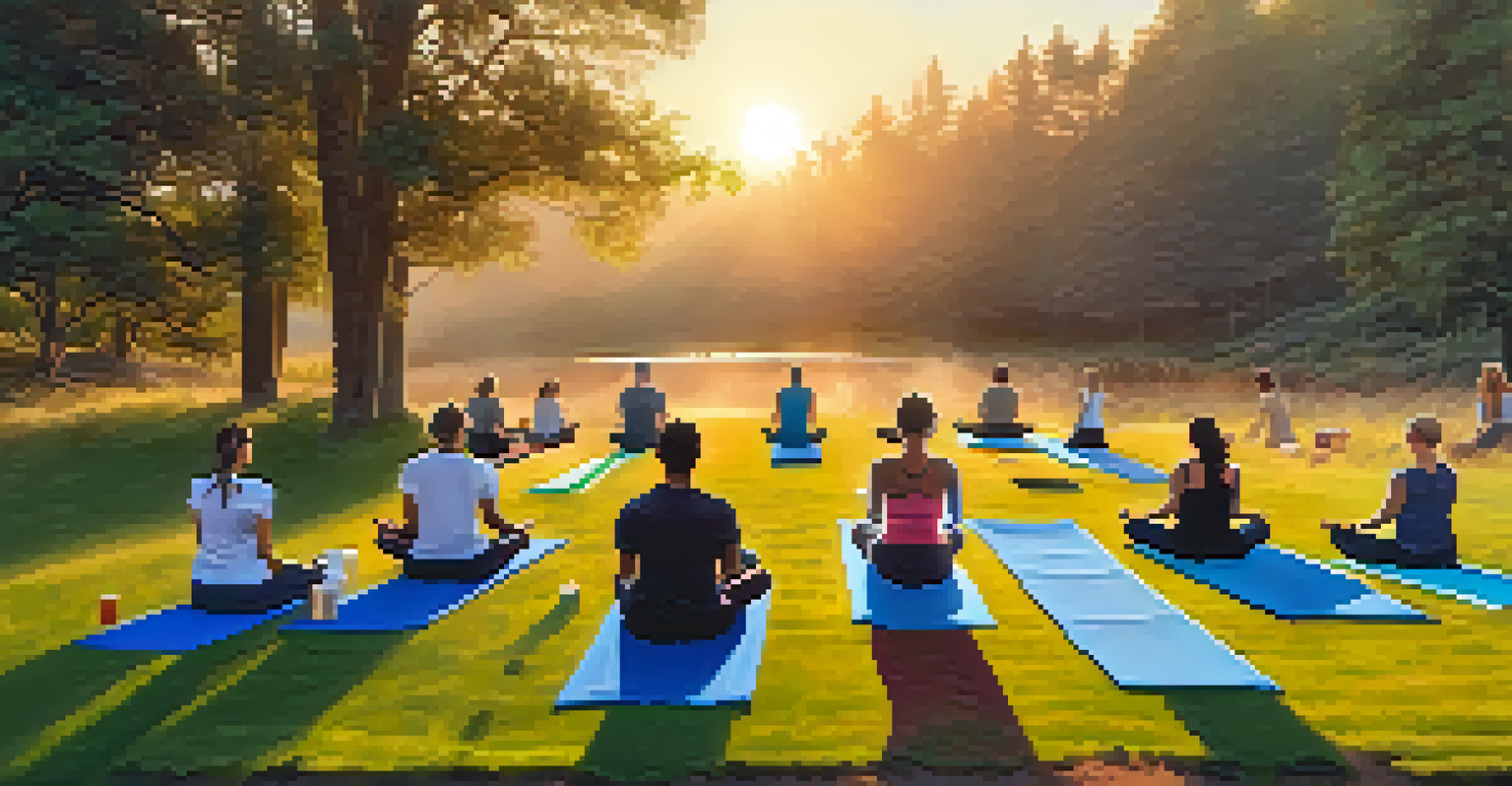Exploring the Impact of Aromatherapy in Retreats

Understanding Aromatherapy and Its Benefits
Aromatherapy is the practice of using essential oils extracted from plants to promote physical and emotional health. These oils can be inhaled or applied to the skin, offering a wide range of benefits from stress relief to pain management. The soothing scents can trigger positive emotional responses, making it a popular choice for wellness retreats.
Aromatherapy is a holistic healing treatment that uses natural plant extracts to promote health and well-being.
Incorporating aromatherapy into retreats can create a serene atmosphere that enhances relaxation and mindfulness. Imagine walking into a room filled with the calming scent of lavender or eucalyptus; it immediately sets the stage for a peaceful experience. This holistic approach not only aids in relaxation but also encourages participants to engage more deeply with the retreat activities.
Moreover, each essential oil carries its unique properties; for instance, citrus oils can boost mood, while chamomile can help with sleep. By understanding these benefits, retreat organizers can tailor their aromatherapy offerings to meet the specific needs of their guests, ensuring a personalized and impactful experience.
Creating a Relaxing Environment with Aromatherapy
The environment plays a crucial role in how we feel and interact during retreats. Aromatherapy can significantly enhance this environment by transforming a simple space into a sanctuary of tranquility. By strategically placing diffusers or candles with essential oils, organizers can create an inviting atmosphere that promotes relaxation and connection.

For instance, using scents like sandalwood or jasmine can help to calm the mind and encourage participants to let go of their daily stresses. This atmosphere not only nurtures individual relaxation but also fosters community bonding as guests share their experiences in a peaceful setting. The right scents can act as a catalyst for deeper conversations and connections.
Aromatherapy Enhances Relaxation
Incorporating essential oils into retreats creates a calming atmosphere that fosters relaxation and mindfulness.
Additionally, combining aromatherapy with other elements, such as soft lighting and soothing music, can amplify the retreat experience. When all senses are engaged, attendees are more likely to feel present and connected, making the retreat a truly memorable experience.
Enhancing Mindfulness Practices with Essential Oils
Mindfulness is a key component of many retreats, and aromatherapy can elevate this practice. The use of essential oils during meditation or yoga sessions can help deepen focus and enhance relaxation. For example, diffusing peppermint oil during yoga can invigorate the senses, while chamomile can help settle the mind during meditation.
The use of essential oils is a journey into the heart of the plant; it’s a way to connect with nature and our own inner selves.
Scents can serve as powerful anchors for mindfulness; when participants associate specific aromas with relaxation, they are more likely to access that state of mind in the future. This association helps in cultivating a more profound mindfulness practice that extends beyond the retreat, turning it into a lifelong tool for stress management.
Moreover, incorporating aromatherapy into guided meditations allows participants to explore their inner landscapes more freely. As they breathe in the calming scents, they can more easily visualize their intentions, making each session a transformative experience.
Aromatherapy: A Tool for Emotional Healing
Retreats often provide a safe space for participants to confront and heal emotional wounds. Aromatherapy can be a gentle companion on this journey, helping individuals process their feelings in a supportive environment. For example, bergamot oil is known for its uplifting properties, making it ideal for those dealing with anxiety or sadness.
When participants are introduced to specific scents that resonate with their emotions, it can lead to deeper insights and breakthroughs. This is especially true when combined with other therapeutic practices, such as journaling or group discussions, allowing individuals to explore their feelings more openly.
Essential Oils Support Emotional Healing
Aromatherapy can help participants process emotions and gain insights during retreats, contributing to personal growth.
Furthermore, the act of engaging with aromatherapy—whether through inhalation or topical application—can be a mindful practice in itself. This engagement fosters self-awareness and encourages individuals to tune into their emotions, creating a pathway for healing and personal growth.
Incorporating Aromatherapy in Daily Retreat Activities
Aromatherapy can seamlessly integrate into various retreat activities, enhancing the overall experience for participants. For instance, incorporating essential oils into cooking classes not only enriches the dishes but also engages the senses in a unique way. Imagine crafting a herbal tea with the soothing scent of chamomile or a flavorful dish infused with fragrant rosemary.
In addition to culinary experiences, aromatherapy can be incorporated into workshops, such as crafting your own essential oil blends. This hands-on approach allows participants to explore the properties of different oils, fostering creativity and personal connection to the practice. They leave the retreat with a tangible reminder of their experience and a tool for continued wellness.
Moreover, outdoor activities can also benefit from aromatherapy. Whether it's a nature walk or outdoor yoga session, using portable diffusers or personal inhalers can elevate the experience, making it more immersive and rejuvenating. This holistic approach ensures that participants remain engaged and connected to both nature and themselves.
Safety and Best Practices in Aromatherapy
While the benefits of aromatherapy are numerous, safety should always come first. It's essential for retreat organizers to educate participants about proper usage, including dilution and potential allergies. For example, some individuals may have sensitivities to certain oils, so offering a variety of options can accommodate different needs.
Additionally, providing a clear guide on how to use the essential oils effectively can empower participants. This includes information on methods of application, appropriate dosages, and how to identify quality oils. When individuals feel informed and safe, they are more likely to embrace aromatherapy as part of their wellness journey.
Integrating Aromatherapy in Activities
Aromatherapy can be seamlessly woven into various retreat activities, enriching experiences and engaging the senses.
Lastly, incorporating feedback sessions regarding the scents used during the retreat can help organizers improve future experiences. Understanding participants' preferences and reactions can guide future selections, ensuring that aromatherapy remains a positive and impactful element of the retreat.
The Future of Aromatherapy in Wellness Retreats
As wellness retreats continue to evolve, the role of aromatherapy is expected to expand even further. With growing awareness around mental health and self-care, more retreats are likely to integrate holistic practices like aromatherapy into their offerings. This evolution reflects a broader trend towards personalized wellness experiences that cater to individual needs.
Innovations in aromatherapy, such as personalized scent profiles created through technology, could revolutionize how participants experience these retreats. Imagine a retreat where each guest receives a custom blend tailored to their emotional and physical needs, enhancing the overall therapeutic effect.

Ultimately, the future of aromatherapy in retreats looks bright. As more people recognize the power of scent in influencing mood and well-being, we can expect to see this practice become a staple in wellness programs, helping participants find balance and rejuvenation in their lives.